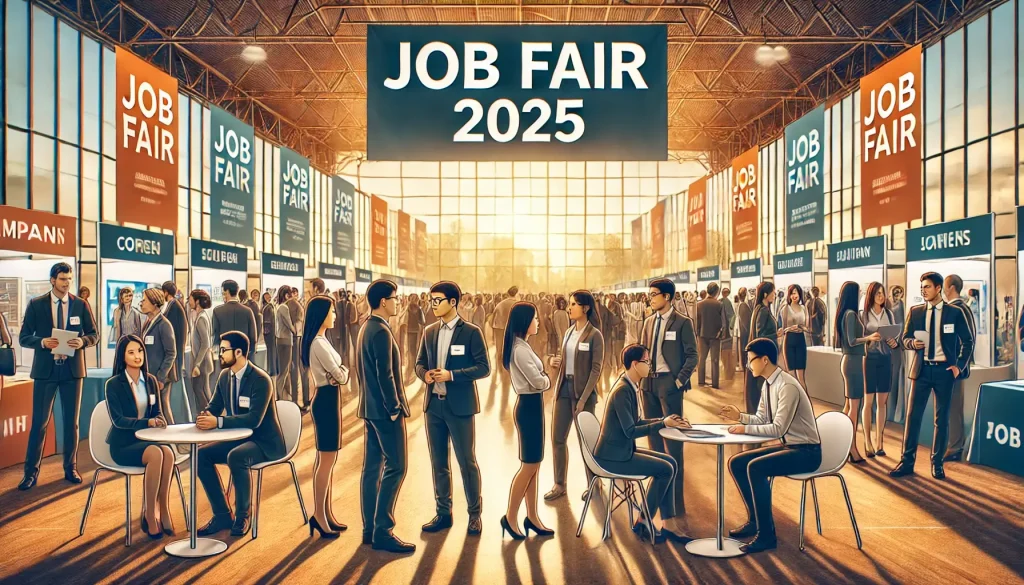Job Fair: Bridging Talents with Opportunities for a Better Future

Introduction: Start Your Career Adventure
Job fairs have become one of the most effective ways to connect job seekers with companies seeking the best talent. These events offer a golden opportunity for fresh graduates, experienced professionals, and companies to meet face-to-face and explore employment possibilities. Whether held offline, online, or hybrid, job fairs play a vital role in boosting employment rates, strengthening professional networks, and providing valuable career insights.
Career Support, as a dedicated event organizer specializing in job fairs, takes pride in creating impactful events that benefit both job seekers and companies. This article will explore the significance of job fairs, how they work, and how Career Support brings innovation to job fairs through digital integration and advanced recruitment solutions.
1. Get to Know Job Fairs
What is a Job Fair?
A job fair is an event where companies, recruiters, and job seekers gather to exchange information about job opportunities. It serves as a platform for job seekers to submit their resumes, conduct interviews, and gain insights into various industries.
Job fairs not only bridge the gap between employers and job seekers but also create valuable networking opportunities that can open doors to long-term career prospects.
Benefits & Objectives of Job Fairs
- Connecting Job Seekers with Companies
Job fairs provide direct interaction between job seekers and company representatives, giving participants the chance to present themselves personally to potential employers. - Information on Job Opportunities
Companies share detailed information about job openings, salary ranges, and career advancement opportunities. - On-Site Interviews
Many companies conduct live interviews during job fairs, offering participants the possibility of receiving job offers on the same day. - Expanding Networks
Job seekers can connect with professionals from various industries, enhancing their career prospects. - Increasing Career Awareness
Participants gain a better understanding of job market trends, industry demands, and future career paths.
2. How Job Fairs Work
Modern Job Fair Formats
Job fairs have evolved to cater to various needs, offering three formats:
- Offline Job Fairs
Held in physical venues, allowing face-to-face interactions between job seekers and recruiters. - Online Job Fairs
Conducted through digital platforms, providing access to job seekers from anywhere. - Hybrid Job Fairs
A combination of offline and online formats, offering greater flexibility and accessibility.
Preparation Process
Organizing a job fair involves several steps:
- Selecting the event date and location.
- Company and participant registration.
- Event promotion through various media channels.
- Booth setup and logistics management.
- Interview scheduling and participant guidance.
Industry and Educational Collaboration
Job fairs often involve partnerships between industries and educational institutions. This collaboration helps companies find the right talent, while educational institutions gain valuable insights into industry demands and improve their curricula accordingly.
Post-Event Evaluation
After the job fair, organizers analyze key performance indicators such as:
- Number of participants and companies.
- Number of interviews conducted.
- Participant feedback.
- Job placement rates.
These insights help organizers improve future events.
3. Career Support’s Role in Job Fairs
Event Organizer Expertise
Career Support acts as both an event organizer and event consultant, managing the entire job fair process from planning to execution. With an experienced and dedicated team, Career Support ensures that each job fair delivers maximum impact for all stakeholders.
Consultation Services
Career Support provides tailored solutions for companies and educational institutions, helping them optimize their participation and achieve their goals.
Industry Contribution to Education
Career Support brings leading companies into job fairs that not only offer job opportunities but also support education through internships and project-based collaborations.
Successful Job Fairs in 2024
Throughout 2024, Career Support successfully organized multiple job fairs, connecting thousands of job seekers with top companies across various industries. These events significantly contributed to business growth and career success.
4. Digital Transformation in Job Fairs
CV Management Efficiency
Career Support introduces a digital CV management system that allows participants to upload and submit their CVs through an online platform. This system eliminates the hassle of carrying paper CVs and streamlines the recruitment process.
Benefits:
- Easy digital submission.
- Quick access for recruiters.
- Environmentally friendly approach.
5. Time-Saving Recruitment Process
With the digital system, companies can:
- Instantly access and sort CVs.
- Use automatic filters to screen candidates based on predefined criteria.
- Speed up the recruitment process and boost team productivity.
6. Company Data Integration
Career Support’s platform allows company data integration, making the recruitment process more seamless.
Key Features:
- Centralized access to applications.
- Automatic filtering of candidates.
- Structured follow-up processes, including interview scheduling and notifications.
7. Data Accuracy
A digital system reduces human errors in data entry, ensuring that all information is consistently recorded.
Advantages:
- Reliable application tracking.
- Faster candidate evaluation.
- Higher accuracy in candidate selection.
8. Cost Savings
Switching to digital processes helps companies and participants save costs by:
- Reducing paper usage.
- Automating application management.
- Minimizing storage costs with centralized databases.
9. Real-Time Monitoring
Organizers can monitor job fair activities in real time, allowing for quick decision-making and immediate responses to any issues.
Real-time data helps:
- Track participant numbers.
- Identify hiring trends.
- Improve the overall event experience.
10. Direct Access to Companies
Job fairs offer participants a unique opportunity to:
- Expand their professional network.
- Participate in on-site interviews.
- Receive immediate job offers.
11. Process Efficiency Improvement
Digital systems streamline administrative tasks, allowing recruiters to focus on candidate evaluation and interaction. This results in a faster and more effective recruitment process.
12. Increased Job Placement Opportunities
With a wide range of participating companies, job seekers have more options and can be more strategic in selecting suitable jobs.
13. Company Branding Enhancement
Job fairs allow companies to:
- Promote their brand to a broader audience.
- Showcase their company culture and values.
- Build direct relationships with potential candidates.
Conclusion: Empowering Careers, Connecting Futures
Job fairs play a crucial role in bridging the gap between job seekers and employers, offering a dynamic platform for career advancement and business growth. With digital innovation, real-time monitoring, and industry collaboration, Career Support is redefining job fairs to be more efficient, accessible, and impactful.
Whether you are a job seeker, company, or educational institution, participating in Career Support’s job fairs is your gateway to unlocking new opportunities and shaping the future of work.
Join Career Support Job Fair 2025!
Let Career Support help you connect with the best talents and top companies. Stay tuned for our upcoming job fairs and become part of a growing community that empowers careers and builds brighter futures.
Visit our website: www.careersupport.com
Email us: [email protected]
Follow us on social media: @CareerSupportID


